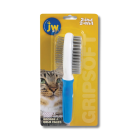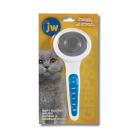
What exactly are cat hairballs?
Hairballs are dense, tubular clumps of soggy hair thrown up by cats. A full body effort is usually required to do so, which can result in some extremely unpleasant sounds. The question is, “What is actually happening to a cat when it hacks up a hairball?”
During the many hours each day your cat grooms itself, they will normally ingest some amount of hair in that process. Hair passes through their gastrointestinal tract and is excreted. Sometimes, either there is too much hair being ingested or something is preventing the hair from passing. That’s when a hairball is formed. The hair gets trapped and slowly builds up in the cat's body until it has no other option but to vomit it out.
Is it normal to have hairballs?
No. Even if something is common, it doesn't mean it's "normal." The more frequently hairballs are occurring, the more concerned a cat owner should be. If hairballs become a daily or even weekly occurrence, this warrants veterinary attention.
Are all cats prone to hairballs?
While most cats will encounter hairballs at some point during their lifetime, cats with medium to long hair are more prone to experiencing them than their short-haired counterparts. Additionally, cats with underlying problems (such as anxiety) that lead to excessive grooming as well as cats with intestinal issues or certain diseases are at higher risk of developing hairballs.
Excessive grooming is one of the biggest causes of cat hairballs. There are many reasons for this, such as allergy, anxiety/behavioral disorders, fleas and other parasites, or pain. Hairballs can also be a sign of gastrointestinal disease or dehydration.
When a cat coughs, it may appear that it is trying to bring up a hairball. Following an extensive coughing episode, cats may gag up a small amount of fluid, and possibly hair, from the stomach, making it even more challenging for owners to understand.
Even if infrequent, pet parents should discuss the issue of hairballs with their veterinarian. They should also take steps to try to get ahead of the problem with prevention methods and cat hairball remedies which we will detail here. We recommend trying to capture the hairball episode on video to show your vet so they can better diagnose the situation.
What Can I Do To Prevent Cat Hairballs?
Regular brushing of your cat is one of the most effective ways to reduce or prevent hairballs. Ultimately, whatever gets swept up in that brush won't end up in their bodies.
By interrupting their cleaning sessions with play time, you may also be able to reduce excessive grooming habits.
If your own preventative techniques don't seem to make a difference, please consult your vet. Your vet can rule out or address underlying causes and also provide customized recommendations specific to your feline.
When it comes to your pet's health, there are no "stupid" questions. If you suspect your pet is sick, call your veterinarian right away.

